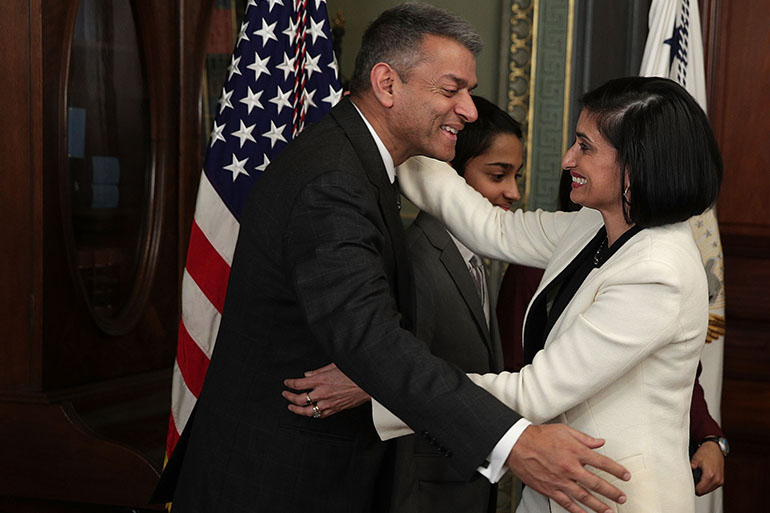Members of the Trump administration and Republicans on Capitol Hill repeatedly say the country’s Medicaid system is “broken” and enrollees struggle to get care because many doctors refuse that coverage.
The top U.S. official overseeing Medicaid — Seema Verma — doesn’t have to look far to find an example. Her husband, Dr. Sanjay Mishra, is one of them.
Mishra is a child psychiatrist in Carmel, Ind., and a partner and medical director of Indiana Health Group, a large medical practice specializing in mental health. That group doesn’t accept Medicaid.
“It’s sadly ironic, but given what I know … I am not one bit surprised,” said Dr. J. Wesley Boyd, associate professor of psychiatry at Harvard Medical School, who co-authored a study this year on the struggles faced by children enrolled in Medicaid as they seek care.
Verma is administrator of the Centers for Medicare & Medicaid Services and a former consultant who helped design Indiana’s Medicaid program.
Jane Norris, a CMS spokesman, said Verma’s husband does not accept Medicaid because that “helps avoid any further conflict of interest or complication of her recusal obligations.”
A spokesman for Indiana Medicaid said Mishra stopped participating in the program in 2007, when Verma began consulting with the state.
Neither Mishra nor a spokesman for his medical group returned calls for comment.
Mishra is one of many specialists nationwide, particularly mental health professionals, who don’t accept Medicaid. Most say the program’s reimbursements are too low.
Matthew Brooks, CEO of the Indiana Council of Community Mental Health Centers, would not comment on Mishra. But he said that in Indiana patients’ ability to get care “is negatively impacted by the limited number of providers, especially in rural areas.”
Dr. James Bien, a pediatrician in West Lafayette, Ind., said he often finds it hard to refer patients — both those who have private insurance and those with Medicaid — to psychiatrists because there is a shortage of such specialists. “It’s really tough. You sort of feel helpless sometimes,” he said. “It’s an even tougher challenge for kids on Medicaid.”
Recently, when looking for help for a teenage patient who attempted suicide, Bien had to refer the boy to a doctor nearly 70 miles away in Indianapolis.
In another case, Bien said, he looked as far as Chicago to find help for a teenage boy with severe depression who was acting aggressively toward his parents and struggling in school. He eventually found a child psychiatrist willing to take this patient more than an hour’s drive away. The family still had to wait weeks for an appointment.
Many families who need a child psychiatrist face long waitlists. And this problem starts with the supply issue. According to the American Academy of Child and Adolescent Psychiatry, there are about 8,300 practicing child and adolescent psychiatrists in the United States — and more than 15 million youths in need of one.
That limited access can have far-reaching consequences. The longer a psychiatric illness or family dysfunction continues, the more difficult it is for the child to succeed. Untreated problems can worsen and lead to difficulties in school.
The challenge is further complicated by the fact that fewer than half of child psychiatrists take Medicaid, said Dr. Peter Metz, a child psychiatrist and professor at the University of Massachusetts Medical School. “It’s a big issue,” he added.
In a 2011 New England Journal of Medicine study, researchers from University of Pennsylvania posing as mothers of children seeking psychiatry appointments were denied 83 percent of the time when they said they had Medicaid and 49 percent when they said they had private insurance.
Boyd and colleagues identified the same problem in their study. Researchers posing as the parent of a depressed 12-year-old who had private insurance or would pay out-of-pocket got an appointment with a psychiatrist or pediatrician 37 percent of the time. When the researchers making the call said they had Medicaid coverage, that figure dropped to 22 percent, the study found.
Metz said there’s a simple reason why Mishra and many child psychiatrists don’t take Medicaid. “It’s financial, it’s because of the low reimbursement rates that Medicaid pays,” he said. Although rates vary by states, Medicaid often pays the specialists less than half the fee they could collect using private insurance or charging a patient directly, according to several psychiatrists.
Paul Gionfriddo, CEO of Mental Health America, an advocacy group, said a cut in federal Medicaid funding would make it harder for states to increase reimbursement rates to providers and entice more of them to see enrollees.
“It would be better if Seema Verma’s husband were to accept Medicaid, not just for the appearance of supporting the program his wife oversees, but to increase access by one more provider,” he said.








